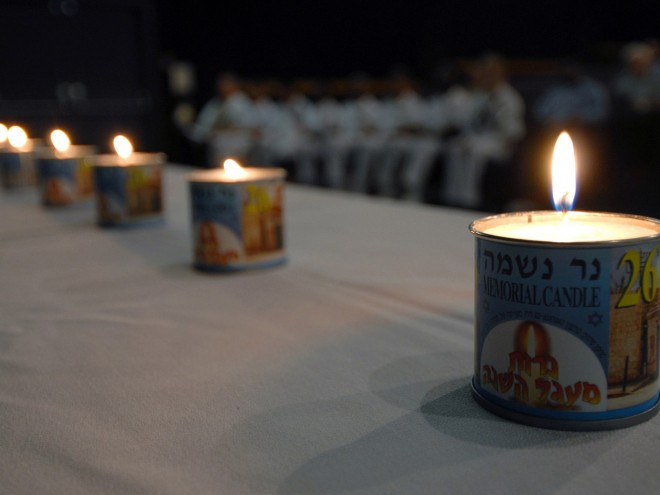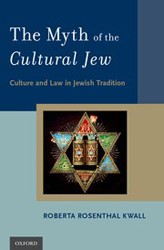Roberta Rosenthal Kwall is the Raymond P. Niro Professor of Law at DePaul University College of Law. Her newest book, The Myth of the Cultural Jew: Culture and Law in Jewish Tradition, is now available. She is blogging here all week for Jewish Book Council’s Visiting Scribe series.
 I have always viewed human artistic creativity as a spiritual type of enterprise, even before the time I began to write about this idea on a more formal basis. I believe that any creative artistic work, be it literature, music, or visual art, is the product of the author’s personal story as shaped by her own experience and her reaction to her surrounding environment. I became an advocate for author’s rights in my role as a legal academic, and much of my legal scholarship has focused on an author’s right to receive attribution and to safeguard her work from unauthorized changes that compromise its message and meaning.
I have always viewed human artistic creativity as a spiritual type of enterprise, even before the time I began to write about this idea on a more formal basis. I believe that any creative artistic work, be it literature, music, or visual art, is the product of the author’s personal story as shaped by her own experience and her reaction to her surrounding environment. I became an advocate for author’s rights in my role as a legal academic, and much of my legal scholarship has focused on an author’s right to receive attribution and to safeguard her work from unauthorized changes that compromise its message and meaning.
My legal research led me to an important book written by historian Daniel Boorstin entitled The Creators, in which he observes that the Torah’s language that “God created man in His image…” furnishes a path leading man to regard himself as a potential creator. I confess that I had never thought about this insight before, despite having read the Biblical text many times. Around the time I encountered Boorstin’s book, I had begun to reconnect with Jewish learning, which had occupied a large part of my adolescent and college years. It suddenly occurred to me that the Jewish tradition is very much like a work of art that has been composed jointly by its many human authors, and based (at least in my view) on its Divine origin. As such, the tradition can be understood as reflecting the personal and environmental circumstances of many of its authors, both the rabbis and lay people. Therefore, both the laws promulgated by the rabbis and the practices of the people have a basis in the cultures that have surrounded the tradition’s authors.
After this realization, it was not a particularly difficult stretch for me to see that so many of the issues I had written about with respect artistic works could also be asked about the Jewish tradition. Specifically, how much can a work (or a tradition) undergo modification and still be considered representative of its original meaning and message? What does society lose when a given work (tradition) loses its essential character and becomes something completely different? Further, who gets to make these changes and pursuant to what type of authority? At base, these questions are all concerned with “authenticity.” In a post-modern age where it is expected that the audience will interpret texts and forge new meaning, these issues loom large in the world of art, especially in our digital era. With respect to the Jewish tradition specifically, many would also argue that it should be subject to new interpretations, especially given the challenges of modernity.
There is a value to changes in any cultural tradition, particularly in more liberal pockets of the community. Still, changes that are not grounded in the fabric of the cultural tradition can compromise important values unique to the tradition. This concern with loss of value and dilution of the tradition’s authenticity justifies a perspective that embraces a degree of selectivity with respect to implementing changes in the tradition. This concern is particularly relevant to the Jewish tradition, and the issue of how much change and evolution it can tolerate and yet retain its authenticity is one that has occupied much of the discourse in certain circles of Jewish thought since the inception of the Enlightenment.
Based on this perspective, I believe that Judaism is not a science but rather a form of art — a cultural product composed of law, wisdom, and narrative, all of which have been shaped by social forces over time and diverse geographic space. My passion for Judaism ignited my work on The Myth of the Cultural Jew. And my desire to transmit this passion to my children served as the impetus for its completion.
Roberta Rosenthal Kwall earned her law degree from the University of Pennsylvania and received her undergraduate degree from Brown University. Currently she is completing a Master’s Degree in Jewish Studies.
Related Content:
- Essays: The Backstory, Inspiration, and Family Ties
- A Code of Jewish Ethics: Volume 2 — Love Your Neighbor As Yourself by Rabbi Joseph Telushkin
- Defending the Human Spirit: Jewish law’s Vision For a Moral Society by Rabbi Dr. Warren Goldstein
Roberta Rosenthal Kwall is the Raymond P. Niro Professor at DePaul Law School. A prolific scholar whose work focuses on Jewish law and culture, Kwall lectures widely at synagogues, Jewish organizations, and law schools in America and Israel. Her popular writings on topics of relevance to the Jewish community have appeared in many of the most established Jewish media venues.



